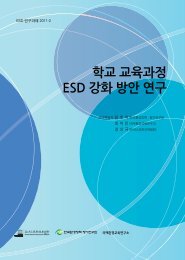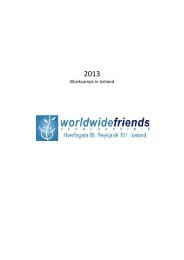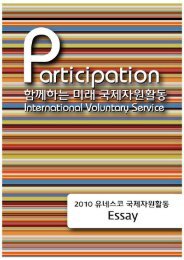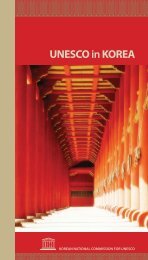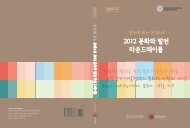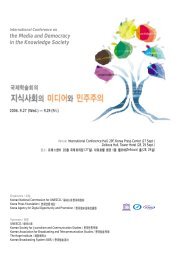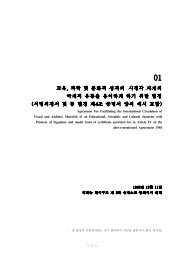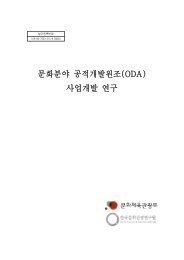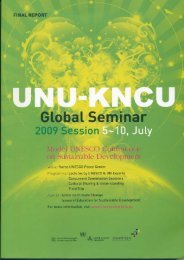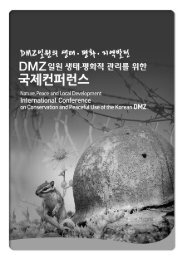Untitled
Untitled
Untitled
You also want an ePaper? Increase the reach of your titles
YUMPU automatically turns print PDFs into web optimized ePapers that Google loves.
compiling high-quality papers from the annual series. New Approaches to New<br />
Futures: Collected Papers from the 2010 ESD Colloquium Series – the first volume of<br />
this series – gives the readers compendious details of five thematic sessions in 2010,<br />
based on green and creative human resources, curriculum and teaching, local<br />
development, educational competitiveness, etc.<br />
Out of the 18 ESD research papers presented at the 2010 sessions, the 10 written<br />
by 10 Korean ESD experts were put in this volume. These papers are expected to<br />
give answers to the crucial question: “How can Korean society properly and<br />
effectively utilize ESD?”<br />
Related to the discussion at the 2 nd World Conference on Arts Education (2010,<br />
Seoul), Yeon-hee Jung stresses that arts education contributes to extend sustainable<br />
thinking and has basic values and principles of ESD. Sun-kyung Lee illuminates the<br />
capacity of ESD - understanding and resolving intricate problems in modern society<br />
through systematic thinking, also spotlighting characteristics of social transformation<br />
of ESD. Mi-sug Jin and Gyu-hee Hwang analyze “green growth,” a brand-new<br />
national development strategy of Korea, as a basic framework for sustainable<br />
development and clarify several requirements for nurturing “green talents” in the<br />
world of work. Joo-hoon Kim, likewise, emphasizes inclusive change of educational<br />
process by introducing green growth in Korean society.<br />
Dong-wook Lee suggests the specific plan to spread the concept of ESD through the<br />
application of state-of-the-art Information and Communication Technology (ICT)<br />
such as smartphones, and mentions the appropriateness of the link between ESD<br />
and Corporate Social Responsibility (CSR) in that ESD provides fundamental<br />
solutions to different global issues. Eun-jin Park and Jung-ki Cho focus on the reality<br />
of the national division of North and South Korea; Park underlines that ESD<br />
functions as a mechanism to mediate various decision-makers in the entire process<br />
of utilization and development of the Demilitarized Zone (DMZ), and Cho attempts to<br />
talk about existing unification education from the viewpoint of ESD framework –<br />
Koreans’ joint prosperity. Youl-kwan Sung and Mi-hye Chang pinpoint the<br />
demographic change in Korean society and grasp ESD functions in terms of Global<br />
Citizenship Education (GCE) and multicultural education.<br />
In the next five years, this series will accelerate in-depth debates among<br />
stakeholders for effective vitalization of ESD in Korean society and will also be a<br />
facilitator for contributing to global sustainable development.



